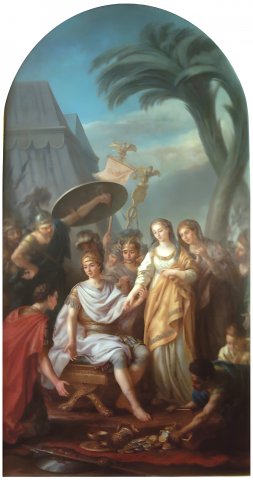Scipio's continence (Warsaw version) - Vien
Notice précédente Notice n°3 sur 4 Notice suivante
Description
"The soldiers then brought him a captive: she was a young girl, already tall and of such beauty that she attracted every eye wherever she went. Scipio asked her about her homeland and her parents, and learned that she was engaged to a Celtiberian prince: the young man's name was Allucius. He immediately sent for his parents and fiancé from their home and, hearing that the latter was dying of love for his fiancée, he addressed him, as soon as he arrived, in more studied terms than his parents: "Young man," he said, "I call you young man so that the tone of our conversation is freer. For my part, when your fiancée, taken by our soldiers, was brought to me, I heard that she was very dear to you, and her beauty made me believe it; because myself, if I were allowed to enjoy the pleasures of my age (especially when it comes to regular and legitimate love) and if the interests of the State had not monopolized me, I would want to be indulged if I loved my fiancée with too much passion, I favor your love since I can do so. Your fiancée has been treated with the same respect by me as by your parents-in-law, her own parents; she has been kept for you so that the gift you have been given may be intact and worthy of me and of you. This is the only price I set for this gift: be a friend of the Roman people and, if you think I'm a good man like my father and uncle were, whom the people here already knew before, know that there are many men like us in the city of Rome, and that no people on earth today can be named whom you would less like to have as an enemy to you and yours, or whose friend you would prefer to be." The young man, distraught with both confusion and joy took Scipio's hand and asked all the gods to pay for him the debt of gratitude to the latter (Cum adulescens, simul pudore et gaudio perfusus, dextram Scipionis tenens deos omnes invocaret ad gratiam illi pro se refenredam) ; he himself did not have the means to do so in proportion to his feelings and Scipio's merits in his regard; the girl's parents and relatives were then summoned; they, seeing that the girl was being returned to them without ransom, even though they had brought quite a large quantity of gold to buy her back, began to beg Scipio to accept this gold as a gift from them: they would be no less grateful to him for accepting it, they asserted, than for handing over the girl free of all outrage. " (Titus Live, Roman History, book XXVI, chap. 50.)
Scipio accepts the gold, but gives it to Allucius in addition to the girl's dowry. Allucius joins Scipio's army with 1400 elite cavalrymen.
2. The painting had been commissioned from Boucher, who produced a sketch but, in order to subtract himself from Mme Geoffrin's "despotism", discharged himself in favor of Vien. Completed in 1768, the painting was not exhibited at the Salon. The idea of justice was to be represented by Scipio's Continence; the idea of emulation, by Caesar in front of the statue of Alexander; the idea of magnanimity, by Pompey's Head presented to Caesar; the idea of concord, by Scilurus, king of the Scythians, gathering his children.
Technical Data
Notice #000759


